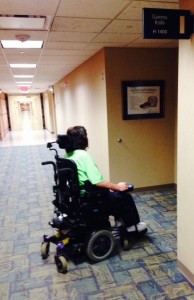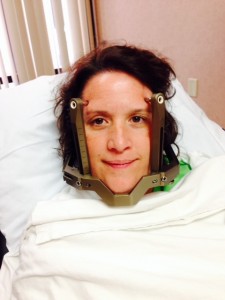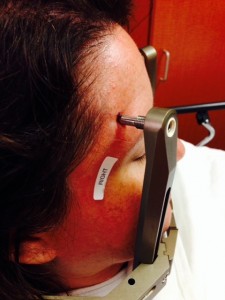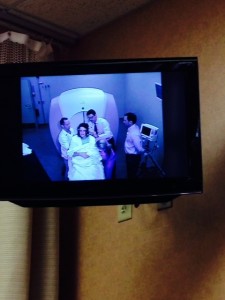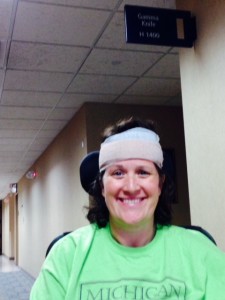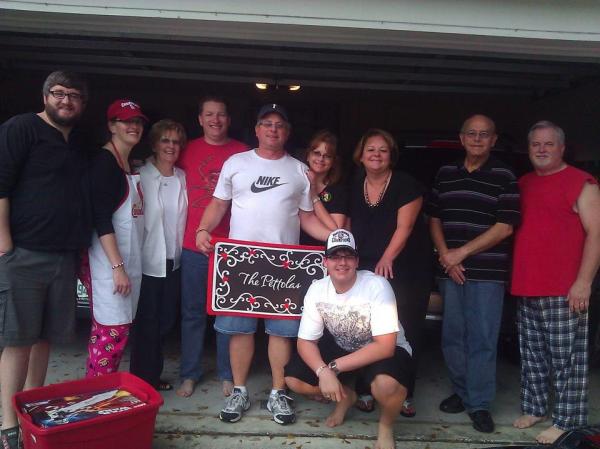Welcome to the Carnival of MS Bloggers, a monthly compendium of thoughts and experiences shared by those living with multiple sclerosis.
by Valéria at It's complicated.
What I remember most about the first two years of MS is the hunger. I remember lying flat on my mattress, hungry. Close your eyes, go back to sleep.
I’m hungry.
I’m tired. No: I’m decimated. In this game of rock-paper-scissors, tired always wins out over hungry. I close my eyes. I drift in and out of sleep. Four hours pass. I wake up and think: I’m so hungry. Sleep. Eight hours. Still hungry. More sleep. Twelve hours. So fucking hungry. Knocked out again. Sixteen hours. Twenty hours. Sometimes twenty-four or more. Still hungry. Still fucking hungry.
Each time I awake I briefly contemplate getting up, foraging for something to eat. But the walk through the living room, past the bathroom, into the kitchen is long, and I am weak. The thought of opening the fridge or a cabinet, of microwaving something, is beyond me. And so I sleep.
I cry.
I remember crying because I was so fucking hungry but unable to get up and feed myself. I remember lying flat, limbs extended. Limp as a puppy, sobbing.
Sometimes I could make it to the fridge. I remember eating bread. Rolls. Holding onto the walls for support. Using my apartment as a walker.
I remember that when the disease hit it was nuclear. It obliterated me. I remember dreaming about 9/11 because my body identified with the collapse of those twin towers.
Whenever I was trying to do something difficult that required an extensive amount of concentration—like traverse an apartment, open a fridge, or take a piss—I would listen to my own breathing. To the silence.
I remember a stillness, a quietness that I’d almost never felt before and have almost never felt since (except on really bad days when, in class, I find myself again seeking out a wall to strategically hold onto in order to create the illusion that I’m not about to collapse–all of course while continuing to seamlessly deliver the day’s lecture on the present subjunctive, or vocabulary pertaining to zoo animals).
Crossing a street can be a victory. Taking a piss can be victory. I count my breaths. I listen.
I remember that for the longest time no human being touched me for any reason other than medical intervention. Nurses grasped my arms to insert needles or tie tourniquets. Doctors placed a firm hand on my back as I failed and failed and failed my Romberg’s test. Imaging techs gently guided my head into place for my 2 to 3 hour long MRI scans. The only touch I experienced was being strapped, tied, punctured, swabbed, infused, and physically manipulated. The worst is when they deliberately induce muscle spasms. I always beg for them not to deliberately induce muscle spasms. Please, please don’t do that thing. You know—that thing.
I remember having to do pulse steroids every single month for almost a year—along with thrice-weekly injections of Rebif—just to achieve something remotely like “remission.” The drugs demolished my immune system, leaving me with the blood cell counts of someone HIV+.
I remember being too weak to stand up after steroid infusions. Listen, I get 1,000mg of Solumedrol in 500ml of saline, — an assertion on my part which would inevitably cause the nurses to protest because “That’s more saline than normal. Why do you get so much saline?”
If you don’t give me 500ml of saline and infuse slowly over the course of 2 hours I will throw up.
“We usually infuse this in 30-40 minutes.”
Fine, then I’ll throw up.
“Fine. We’ll do it your way then.”
Fine.
They did it my way.
I remember leaving Brigham and Women’s at rush hour on a weekday and the #66 bus being jam-packed and me with a bandaged arm, glassy eyes, and an inability to stand and nobody—nobody—would offer me a seat. I remember sitting on the floor of the bus because I could not stand. I became stubborn in my willingness to sit down on floors, on the ground. Whenever I was out in public and became too fatigued to stand, I would simply sit down—wherever I was. Right there. Sit.
No, I don’t care who is looking. No, I don’t care what you think. I am sitting. Right now, right here, what I am doing is sitting, and I will get up when I am good and ready, and if you want to leave me here then go, fuck you, I don’t care.
I just need a minute. I just need an hour. A day. A few days. Just a week. A month. A couple of years, actually. Be right back.
Just need to get my bearings.
Just need this wall here. This is a good, solid wall. I love this wall. It’s not going anywhere, and I can lean on it. Holy shit: this wall is amazing. This wall is here for me. I love you, wall. Wall, I love you.
Whenever I would receive steroid infusions the only thing I could eat for days was Vietnamese food from Lês in Harvard Square. Pho chay, specifically.
I need limes from the grocery store. I need Vietnamese food and I need limes. I need, like, 40 limes. I need to get them before the steroid crash that’s coming in a few hours. Before it’s too late. I have to go, now, to the grocery store and buy like $40 worth of limes. Right now. Don’t bother me. I am on a mission. Don’t text me anymore because I need limes, OK? Goodbye. I need limes.
Steroids have a half-life of around 18-26 hours. If you’ve been infused with high doses for days in a row, your adrenal glands stop producing cortisol. Houston, this is a problem. I remember the crashes—the sweats, the muscle weakness, the inability to stand up (more so than usual), the bone pain.
This is why I need Vietnamese food and I need limes, and I need them now, before it’s too late.
I remember that I was left for dead for 2 years. Left for dead by everyone who was supposed to be there. Left for dead like an injured racehorse ready to be shot. I remember seriously weighing the hypothesis that perhaps I had already died and this was why I was being kept separate from the living. Why it seemed that no one could see me anymore. Why my ontological status seemed to have changed. I lay flat. Breathed. Waited. And sometimes, yes, I cried.
by Stacie at Keep Doing What You're Doing
I’m doing the best I can. I may not be doing EVERYTHING I can, but it’s still enough.
I’ve been experiencing some additional MS symptoms lately. It’s completely understandable given I’m experiencing more stress than usual. Still, when healthy habits lead to feeling better it’s easy to blame myself for not living a perfect, healthy life when symptoms emerge.
When I was diagnosed with MS, I felt like my body had betrayed me and I could no longer trust it. I thought I was super healthy, and suddenly my body went numb. Doctors told me I had an incurable disease that I’d had for years.
In my research of how others coped with MS, I often heard people approach it as warriors fighting a daily battle against their disease. I can appreciate the analogy and it makes sense, but it never resonated with me. Fighting myself feels exhausting. And what am I fighting? I have a super active immune system that thinks the insulation on my nerves (myelin) is an invader and needs to be destroyed. My immune system is fantastic at destroying other invaders. It’s just confused with myelin some of the time. Bummer.
It occurred to me to think of my body as my buddy who is great at some things and sucks at others but I love her just the same. My body didn’t betray me. She is doing the best she can. She held up magnificently for a long time, and she continues to do amazing things. My neurologist says with my MRI scans he would expect me to have some disability. At this point I have symptoms I notice but no one else does. I think it’s awesome that my body has compensated to get the nerve messages to parts of my body blocked by lesions.
It’s taken me time to shift my thinking from feeling betrayed to trusting myself again. Now I think being healthy and having an incurable disease are not completely opposite ends of the spectrum. They can both be true in one body.
My body has been doing the best it can all my life. Some of my habits help it, and some challenge it. Some activities and foods don’t support optimal physical health, but they nurture my mental health and feed my soul. Sometimes I’m coping and sometimes I’m nurturing. I think stressing out about not doing more can be more harmful to my health than the occasional indulgence.
So I may not be doing everything I can, but I’m balancing all aspects of my health in order to lead a fulfilling, active and hopefully long life!
This concludes the 154th edition of the
Carnival. The next
Carnival of MS Bloggers will be hosted here on May 1, 2014. Please remember to submit a post (via
email) from your blog of which you are particularly proud, or which you simply want to share, by noon on Tuesday, April 29, 2014.










